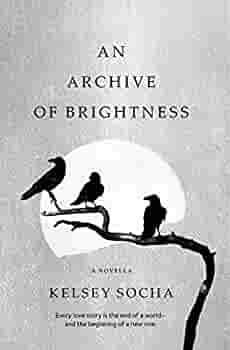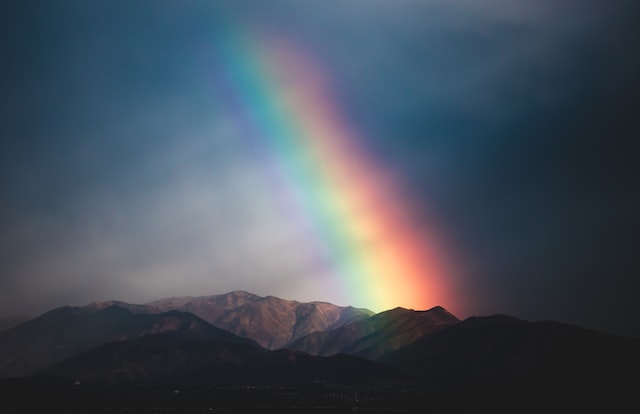by Nicole Yurcaba

Lanternfish Press is one of those presses I discovered quite a few years ago at AWP and have followed ever since. What initially impressed me about Lanternfish Press is their dedication to the strange, the gothic, the taboo. Their catalog is a refreshing cabinet of curiosities. One of their latest releases, Kelsey Socha’s An Archive of Brightness, is a refreshing novella which grips readers not only with its philosophical takes on beginnings and endings but also its intimate poesy.
An Archive of Brightness threads multiple stories into one. Two small-town lobstermen harbor a secret affection. A lonely architect builds structures from scorpion skeletons in a desert town. A young girl begins growing wings and struggles with her new, developing body. A chef in an Antarctic research facility sews anatomical hearts into her beloved’s lab coat. In the skies, murders of crows and a ragtag vulture collect each story and archive them as they build an archive of brightness.
The novella’s magic forms because of its language. At times it’s blunt and direct, even commanding. At other times it’s imaginative and smooth like a silky rainbow on which readers glide into unknown realms. Compression works favorably in the novella’s case. Its brief form pushes the novella’s language to its maximum, and it’s undeniable that each word matters and contributes to the novella’s overall emotion. Packed quietly into larger, denser paragraphs are dramatic, yet simply structured statements such as “Nothing is ever as isolated as it feels on the surface.” It’s a statement ultimately establishing the novella’s core message: life is a series of interconnections.
Occasionally, the novella offers readers spiritual snippets and reflections about how eternity’s void balances life’s chaos. In “The Beginning of the End,” the narrator asserts “The present and ephemeral are no match for eternity.” Existence prior to eternity is “the long game.” While the narrator’s sentiments might wax slightly existential and fatalistic, eventually they wane into hopeful, balanced observations: “Occasionally you find yourself not at the end of the world but at the beginning. It’s frightening and unexpected.” In other words, the challenge lies in accepting the changes which transform and reshape not only one’s existence, but ultimately who they are as individuals.
For readers familiar with Lanternfish Press’s catalog, the reprise of a character randomly transforming into a bird might cause them to reminisce about Vikram Paralkar’s The Afflictions, one of Lanternfish Press’s initial literary gems. Stylistically and thematically, the two novels also resonate with each other, especially in their philosophical conversations about existing in the moment, accepting the circumstances as they present themselves, and using one’s abilities to persevere. Where An Archive of Brightness differs, nonetheless, is its open and vulnerable conversation about same-sex romance. This is most evident in its portrayal of the two lobstermen whose display of affection is relegated to the early morning solitude of their lobster boat. Via their characters, the novella explores the forced withering and decomposition natural attraction suffers when oppressed and denied.
An Archive of Brightness also offers readers a small bit of life advice–live in the moment. As the novel concludes, the narrator states “The end of the world ends with this moment. Don’t blink.” It’s a unique, forthright call to remember how quickly quiet opportunities and significant moments pass. Simultaneously, it also beckons readers to enjoy, and find meaning in, the small gestures and interactions which create a new beginning from another moment’s ending.
Of course, An Archive of Brightness possesses its Transcendentalist and metaphysical takes on life and existence. Part of the novella’s intrigue lies in its careful balancing of the human world with the natural one, most evident in the plot line’s presentation of the crows and vultures archiving brightness. The crows in An Archive of Brightness aren’t so different from the crows released by Odin each day as his messengers in the Norse myths. Rather than rely on traditional stereotypes and associations, the novella embraces a new take on these keen archivists.
An Archive of Brightness is an emotional investment, an archive of tender moments so often overlooked or ignored. It may just be the novella readers need for 2023 and whatever challenges the new year offers.
Nicole Yurcaba (Ukrainian: Нікола Юрцаба–Nikola Yurtsaba) is a Ukrainian (Hutsul/Lemko) American poet and essayist. Her poems and essays have appeared in The Atlanta Review, The Lindenwood Review, Whiskey Island, Raven Chronicles, West Trade Review, Appalachian Heritage, North of Oxford, and many other online and print journals. Nicole teaches poetry workshops for Southern New Hampshire University and is a guest book reviewer for Sage Cigarettes, Tupelo Quarterly, Colorado Review, and The Southern Review of Books.



Add your first comment to this post